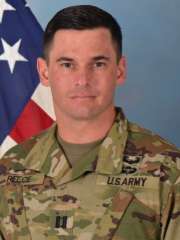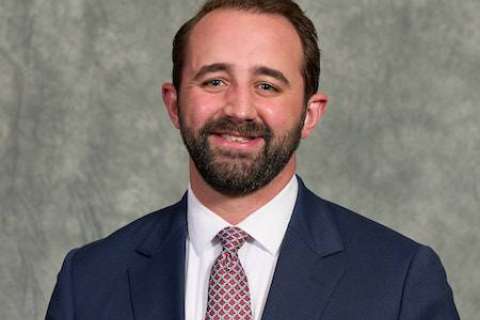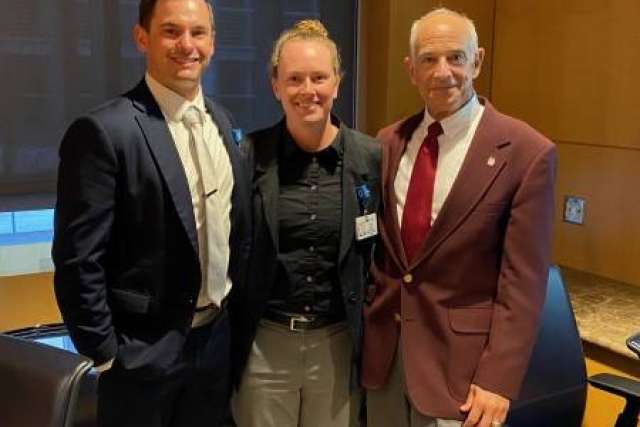On his way to earning two master’s degrees — in health and business administration — U.S. Army Captain Trent Reece is spending a year with UCLA Health administrators to learn best practices in health care system administration and leadership.
Reece is one of just three graduate students from across the country chosen to participate in UCLA Health’s Administrative Fellowship for the 2022-2023 academic year.
“It’s an opportunity to make a meaningful impact, to learn from the best and to bring those practices back to the Military Health System,” Reece says.
Just as recent medical school graduates seek residency at top hospitals to hone their skills through hands-on training in their field, aspiring health care administrators get in-depth, on-the-job education through UCLA Health’s Administrative Fellowship.
“The fellowship is a start to a career,” says Drew Weil, MPH, director of hospital operations at UCLA Health and preceptor of the Administrative Fellowship.
“As an academic medical center, it’s part of our mission to deliver leading-edge patient care, research and education,” says Weil, a former fellow himself. “And that mission includes training the health care administrators of the future, too.”
Army-Baylor partnership
Reece comes to UCLA Health through a decade-long partnership with Army-Baylor Graduate School, which offers a concentrated, intensive academic program followed by fellowship training.
“Just having the opportunity to serve in one of the top institutions in the country while still being an active-duty Army officer was one that I couldn’t turn down,” Reece says. “The whole purpose, coming from the military standpoint, is: embed within the health system, work on projects that have a meaningful impact for the entire health system, but also glean those best practices and see some of the cutting-edge stuff that’s being done so we can bring it back to the Army once we’re done with our fellowship.”

Reece is set to serve in an administrative role in the Military Health System after he completes his UCLA Health fellowship in July.
During his fellowship year, he’ll work on various projects within different UCLA Health departments. Among them are a contract-development project with Operation Mend, which provides comprehensive care for catastrophically wounded American veterans; a technical effort to build an electronic dashboard to monitor hospital and physician charges for the Cardiology division; and a communications endeavor to create automated correspondence between referring physicians and UCLA Health.
“It’s a way to update those referring physicians from outside hospitals on the status of their patients,” Reece says of the communications project. “That was an opportunity we identified. There was no good way to tell the referring physician that the patient they sent to us is doing great and has been discharged. We saw that as a way to tie in the UCLA Health vision statement as far as providing acts of kindness.”
It’s an approach he also foresees using in his military health care work, he says, as it’s common to refer patients outside the Military Health System.
“It’s definitely another one of those best practices that could potentially be implemented at any of my future jobs,” Reece says.
The Administrative Fellowship is a symbiotic relationship that benefits both the future health care administrator and UCLA Health, Weil says.
Fellows contribute ideas, enthusiasm, skill and, in the case of the Army-Baylor fellows, “real-world experiences in settings that can be different than a lot of what our civilian or career employees will face.”
Fellows also step in to fill management and support roles that arise due to attrition or unforeseen challenges, such as the COVID-19 pandemic, Weil says.
Embracing the vision

For Reece, one of the most inspirational aspects of the fellowship so far has been seeing “how mission- and vision-driven UCLA Health is,” he says.
UCLA Health’s vision “to heal humankind, one patient at a time, by improving health, alleviating suffering and delivering acts of kindness” shines through in administrative decisions and everyday encounters,” Reece says.
“It’s very apparent that vision is embedded in everything the organization does and is embedded in the culture,” he says.
He recalls sitting in on a daily administrative meeting to review the number of admitted patients and available hospital beds. And despite caring for hundreds of thousands of patients every year, the conversation soon focused on an individual patient.
“The fact that the C-suite executives involved in this meeting are talking about an individual patient and what would be best for that individual patient’s journey just showed me how patient-centered the organization is,” Reece says. “That’s a mindset that I would like to carry with me throughout my time in the Military Health System.”
Learn more about the UCLA Health Administrative Fellowship.



